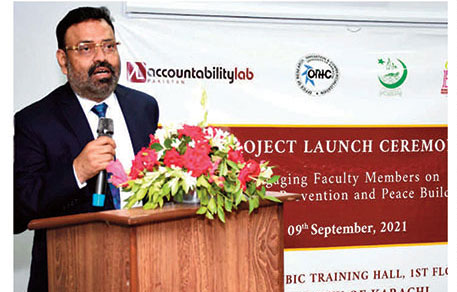The Vice Chancellor University of Karachi Professor Dr Khalid Mahmood Iraqi on Thursday said that like other developed countries we have to excel in the field of science and technology to achieve our developmental goals.
He mentioned that we cannot ignore the fact that science and technology has played a very important role in changing the today’s world.Dr Iraqi was addressing after inaugurating the ‘Training Hall KamyabJawanMarkaz’,–a part of the Prime Minister’s KamyabJawan National Youth Development Programme—at the Karachi University Business Incubation Centre.
The KU VC observed that since the outbreak of the Covid-19 pandemic, the activities of the world, was reduced to almost zero and only modern technology provided much needed support to connect the world.
He said that during the recent lockdowns everyone has witnessed that technology was used as an effective tool in every aspect of life.The Office of Research, Innovation and Commercialization, KU, in collaboration with the Accountability Lab Pakistan also launched a project ‘engaging faculty members on prevention and peace building’ on this occasion.
Dr Khalid Iraqi, while talking about the importance of the peace building, mentioned that dialogue is essential to end conflicts. He believes that conflicts appear when there is no dialogue between the two parties.
He stressed that we should have the capacity to accept others points of view regardless of the fact that we agree with it or not.
“A strong culture of tolerance is necessary for the development of societies. When we talk about training the attitudes of students, no one can do it better than teachers.”
He said that this project would surely help in improving the relationship between the faculty and the students.
Meanwhile, the Vice Chancellor, Sir Syed University of Engineering and Technology, Professor Dr Vali Uddin, said that he has been serving as a faculty member for the last 20 years and this was the first time he has seen such initiative. “This is a topic that can play a key role in the training of faculty members.”










